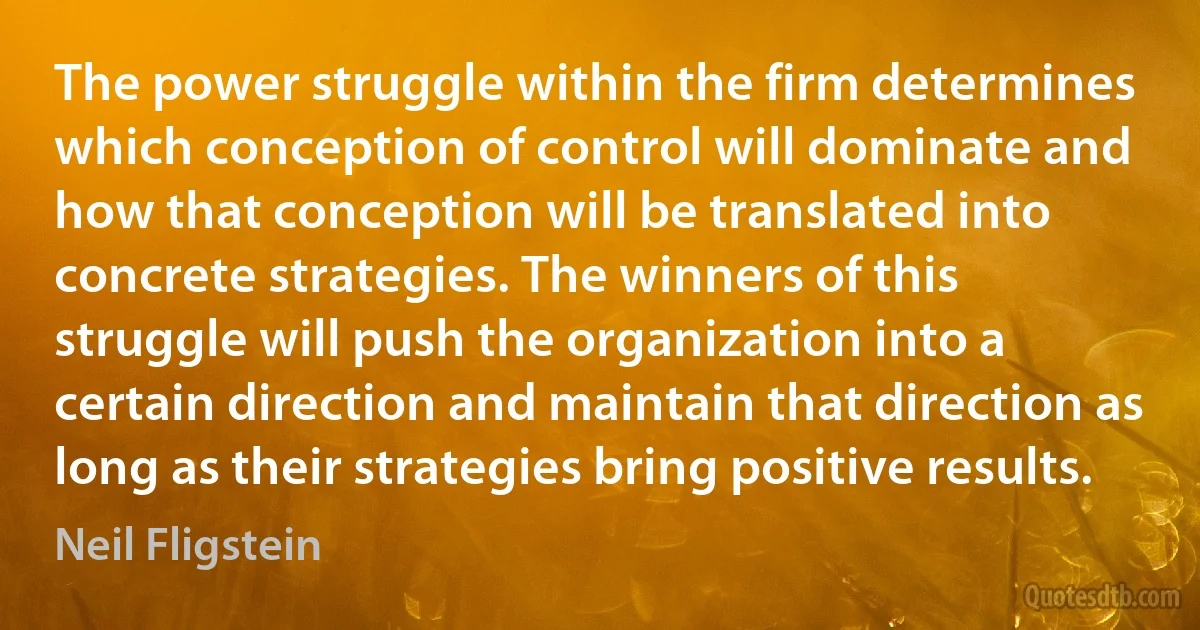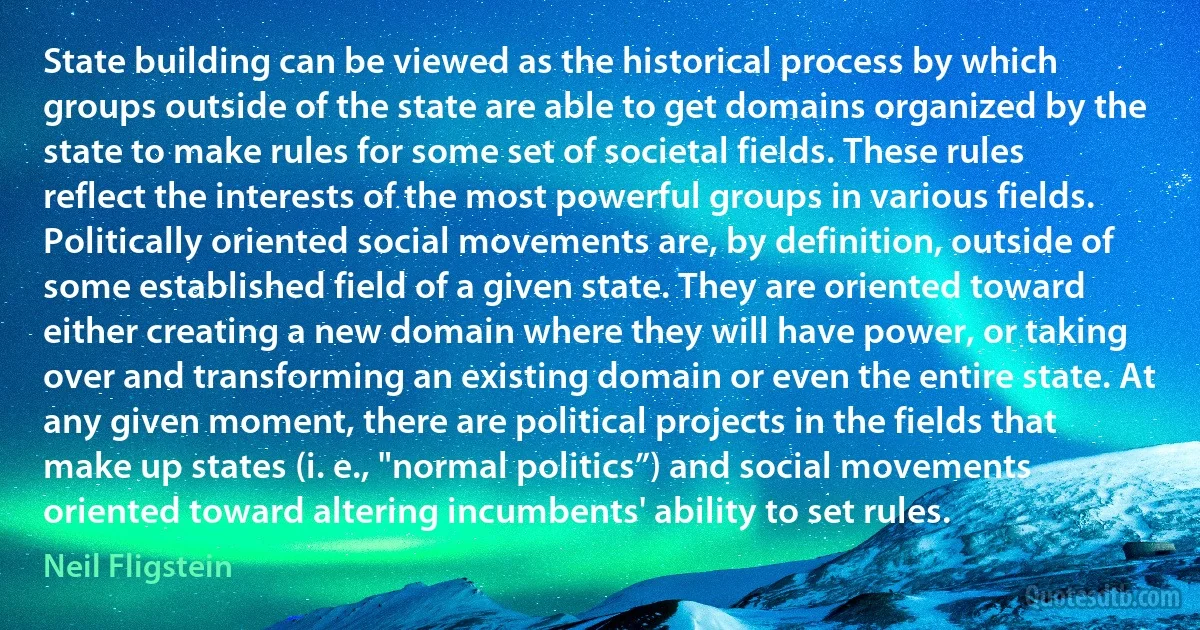Neil Fligstein quotes
The organizational fields of the largest firms continued to be unstable. There were no accepted rules to define how firms could avoid destructive competition, so they attempted to control their markets through various aggressive trade tactics, continued mergers, cartels, getting the federal government to guarantee profitability.

Neil Fligstein
The leaders of the large firms dominated by the manufacturing conception saw the key problem as low prices. This meant that they were intent on controlling prices by cutting production. But once prices were stabilized, they were cautious about increasing production for fear that prices would again collapse. Since their competitors had roughly equal production capacities and costs, all would lose by too rapid an increase in production.

Neil Fligstein
Organizational theories have three origins: Max Weber's original work on bureaucracies which came to define the theory for sociologists, a line of theory based in business schools that had as its focus, the improvement of management control over the work process, and the industrial organization literature in economics. Unlike many fields in sociology, organizational theory has been a multidisciplinary affair since World War II, and it is difficult to understand its central debates without considering its linkages to business schools and economics departments.

Neil Fligstein
Once in place as control perspectives, they are widely shared ways of reducing complexity of the world. They come into the existence in a piecemeal fashion and are articulated by representatives of the largest, most successful firms. They are propagated by the business press and informal links between organizations and then are supported by those organizations and organizational fields.

Neil Fligstein
Property rights, governance structures and rules of exchange are arenas in which modern states establish rules for economic actors. States provide stable and reliable conditions under which firms organize, compete, cooperate and exchange. The enforcement of the laws affects what conceptions of control can produce stable markets. There are political contests over the content of laws, their applicability to given firms and markets, and the extent and direction of state intervention into economy. Such laws are never neutral. They favor certain groups of firms.

Neil Fligstein
They are the basic mechanism of control of the external environment available to managers and entrepreneurs. Organizational fields are not generally benign and cooperative arrangements held in place by a sense of duty or honor the rhetoric and ideology of their proponents might lead one to think so. Instead, they are set up to benefit their most powerful members.

Neil Fligstein
A leading firm that controlled a large portion of the output of a given organizational field operated as a price setter. To set prices, the actors in that firm had to control their suppliers and marketing in order to increase their own efficiency and have the potential to cut off other firms from supplies or customers.

Neil Fligstein
We know that most of the wealth and income of the country is owned by a few large corporations, that these corporations in turn are owned by an infinitesimally small number of people and that the profits from the operation of these corporations go to a very small group with the result that the new opportunities for new enterprise, whether corporate or individual, are constantly being restricted. The committee therefore recommends the vigorous and vigilant enforcement of the antitrust laws, confident that an awakening business conscience will realize the necessity of complete cooperation in the elimination of monopolistic practice.

Neil Fligstein
The marketing director in each department reported directly to the department head and controlled market research and sales. More important, the marketing manager was also responsible for new product development, requesting production schedules, and controlling finished goods inventory.

Neil Fligstein
The Celler-Kefauver Amendment to Section 7 of the Clayton Act has now been made effective by judicial ratification. The Supreme Court has said that the Act means exactly what it says... It prohibits acquisitions, either stock or assets, where competition in any line of commerce in any section of the country may be substantially lessened.

Neil Fligstein
Organizational theory is one of the most vibrant areas in sociological research. Scholars from many subfields, (medical sociology, political sociology, social movements, education) have felt compelled to study organizational theory because of the obviously important role that complex organizations play in their empirical research. But scholars who do not do organizational theory are often struck at how arcane the debates are within organizational theory. They also think most of organizational theory is about firms and thus, the theory does not seem to have much application to other kinds of social arenas.

Neil Fligstein
All large organizations have an internal power struggle over the goals and resources of the organization.... In the largest firms, there are two bases of control : formal ownership and authority. Those who own the firm control by virtue of ownership. Authority relations embedded in the organizational structure legitimate how managers can control organizations.

Neil Fligstein
Neil Fligstein
Occupation: American SociologistBorn: May 23, 1951
Quotes count: 39
Wikipedia: Neil Fligstein



